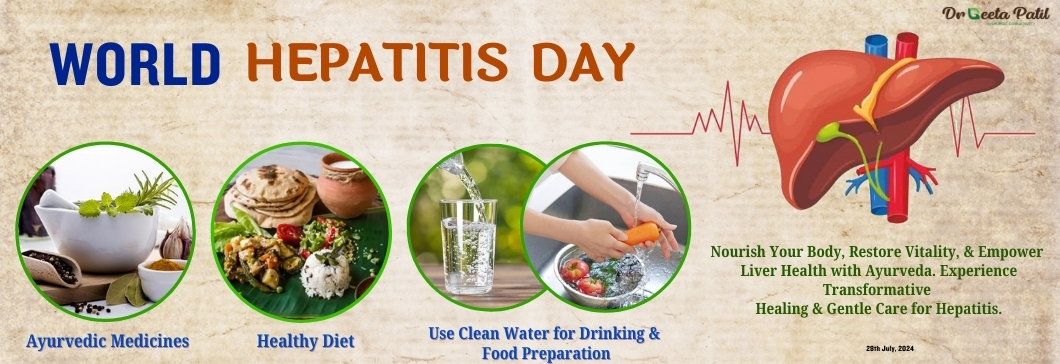Blog
World Hepatitis Day-Ayurvedic Insights on Non-Alcoholic Fatty Liver Disease (NAFLD)

World Hepatitis Day
World Hepatitis Day, observed on July 28th, aims to raise awareness about liver diseases, including NAFLD and hepatitis. This day promotes understanding, shares knowledge, and advocates for the prevention, diagnosis, and treatment of liver diseases. By recognizing this day, we can support efforts to find effective treatments and a cure for liver conditions.
Have you been diagnosed with a fatty liver condition, yet don’t consume much alcohol? This could be a sign of Non-Alcoholic Fatty Liver Disease (NAFLD), a common liver condition that affects individuals who drink little to no alcohol. NAFLD is often overlooked but can lead to serious health issues if not managed properly. Understanding the root causes and implementing lifestyle changes can significantly improve your liver health.I, Dr. Geeta Patil from Sanjeevani Ayurveda, will share insights into NAFLD and how you can manage this condition effectively.
What is Non-Alcoholic Fatty Liver Disease (NAFLD)?
NAFLD is a condition where excess fat builds up in the liver cells in individuals who drink little or no alcohol. This can progress to Non-Alcoholic Steatohepatitis (NASH), a more severe form of NAFLD, which involves liver inflammation and can lead to liver fibrosis, cirrhosis, and even liver cancer.
Symptoms of NAFLD
NAFLD is often called a "silent" disease because many people do not experience symptoms. However, when symptoms do occur, they may include:
- Fatigue
- Weakness
- Abdominal pain or discomfort, especially in the upper right side
- Elevated liver enzymes (detected through blood tests)
Causes of NAFLD
The exact cause of NAFLD is not fully understood, but several factors can contribute to its development, including:
- Obesity
- Insulin Resistance
- High Blood Sugar
- High Levels of Fats in the Blood
- Genetics
- Poor Diet
NAFLD Classification
NAFLD encompasses a spectrum of liver conditions, including:
- Isolated Fatty Liver: Characterized by the accumulation of fat in the liver without inflammation or liver cell damage.
- Non-Alcoholic Steatohepatitis (NASH): A more severe form where fat accumulation is accompanied by liver inflammation and damage. NASH can progress to fibrosis, cirrhosis, and liver cancer if not managed effectively.
Ayurvedic Perspective on NAFLD
In Ayurveda, NAFLD can be linked to an imbalance in the body's doshas, particularly Pitta and Kapha. An unhealthy diet and lifestyle contribute to the accumulation of toxins (ama) in the liver, leading to the fatty deposits and inflammation characteristic of NAFLD. Ayurvedic treatment focuses on balancing the doshas, detoxifying the liver, and promoting healthy liver function.
Ayurvedic Treatments for NAFLD
Ayurveda offers a comprehensive approach to managing NAFLD through dietary changes, herbal remedies, lifestyle modifications, and purification therapies:
Dietary Changes
Ayurveda emphasizes a balanced diet to manage NAFLD:
- Avoid Foods That Aggravate Pitta: Such as spicy, sour, and fried foods.
- Consume Cooling Foods: Include cucumbers, melons, and leafy greens.
- Incorporate Liver-Friendly Foods: Such as bitter greens, turmeric, and garlic.
- Stay Hydrated: Drink plenty of water to support detoxification
Herbal Remedies
Various herbs are known for their liver-healing properties:
- Turmeric (Curcuma longa): Known for its anti-inflammatory and antioxidant properties.
- Guduchi (Tinospora cordifolia): Boosts immunity and supports liver health.
- Amla (Indian Gooseberry): Rich in vitamin C and helps detoxify the liver.
- Kutki (Picrorhiza kurroa): Traditionally used for liver disorders.
Ayurvedic Purification Therapy
Purification therapies, or Panchakarma, are effective in detoxifying the liver and restoring balance:
- Virechana (Therapeutic Purgation): Helps eliminate toxins and balance Pitta dosha
- Basti (Medicated Enema): Detoxifies the colon and improves liver function.
Lifestyle Modifications
Adopting certain lifestyle changes can significantly impact NAFLD management:
- Regular Exercise: Aim for at least 30 minutes of moderate exercise most days of the week.
- Weight Management: Achieve and maintain a healthy weight.
- Stress Management: Practice stress-reducing techniques like yoga, meditation, and deep breathing exercises.
- Avoid Alcohol and Unhealthy Foods: Limit or eliminate alcohol and reduce intake of processed foods and sugars.
Conclusion:
NAFLD can be a challenging condition, but with an understanding of its causes and effective management strategies, individuals can improve liver health and overall well-being. If you are experiencing symptoms of NAFLD or want to learn more about managing this condition, I am here to help. As Dr. Geeta Patil from Sanjeevani Ayurveda, I am committed to providing natural and effective solutions for your health concerns.
Wishing you a healthy and balanced life,
Dr. Geeta Patil
Sanjeevani Ayurveda

